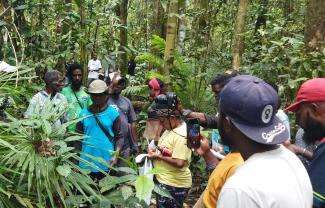Sanggar Seni Budaya Alam Semesta Selemkai (SALSES – Selemkai Arts and Culture Centre), is a community consisting of young people who are active in preserving arts and culture, while also managing eco tourism in Kampung Klabili (Klabili village). Also known as Kalabili (from the language of the Moi Kelim sub-tribe), the village can be found in the Selemkai district of Tambrau regency in West Papua.
From 17–21 February 2022, SALSES held an event entitled ‘Temu Miye Libih Suku Moi dalam Memperingati Hari Bahasa Ibu Internasional’ (the meeting of young people from the Moi tribe to commemorate International Mother Language Day). The purpose of the event was to encourage young people of the Moi tribe to preserve the Moi language and help save it from extinction
The meeting was attended by a Moi Tribe council and members of the House of Representatives of Tambrau, along with several Selemkai village heads, Moi leaders, people from Klabili village and various young people from the sub-tribes of Moi Kelim and Moi Salkhma. These groups learned how to say the names of local plants in sub-tribal dialects, while also rediscovering the myriad ways in which their ancestors used these flora, as herbal remedies, accessories and food.
The event also featured a forum that explored current issues, hopes, aspirations and future plans. This group discussion was led by Torianus Kalami, an activitist from Gerakan Muda Suku Moi (the Moi Tribal Youth Movement). Participants then enjoyed a wide range of music performances, dances, poetry readings and sharing of folklore. These performances involved young people, senior citizens, children and women.
During the meeting, the Head of the Moi Council, Dance Ulimpa, conveyed a number of reasons why preserving the Moi language is important; not least because of its centrality to the identity of the Moi people.
“What we have done as parents is not perfect, and it still has shortcomings,” said Dance in his speech. “You, as (the) young generation, should continue what we have started – now we need to focus on our native language; that’s our future target.”
“Don’t make separation. I have emphasised this everywhere. Our big house is Moi. We have to improve ourselves. Our young people need to work. Our language is a local wisdom, just like Abun Jii, Abun Taat, Moi Kelim, Moi Salkma, Moi Klabra, Moi Sigin [other local sub-tribal dialects],” he continued. Dance sees the Temu Miye Libih event as a potential catalyst for the betterment of the Moi tribe in various fields. As he explained, “we have to build this country; from a cultural perspective, this is Moi's land.”
Another impactful speaker at the event was Chairperson of the Local House of Representatives of Tambrauw, Yeri Sidik, who encouraged the SALSES community to expand their impact by collaborating more closely with local government officials when implementing their activities.
“This event should have been attended by executives, (then) SALSES could have had a chance to present the mission of Tambrau Regency,” said Yeri. “This is a form of conservation of arts, culture and language; don’t hesitate to send proposals to local government,” he continued.
“We appreciate this event. We do have other activities to be done later in the future, but those activitites need to be socialised to people. What you did is important,” added Yeri, before going on to close his speech by expressing hopes that Selemkai will become a hub for livelihoods and a centre for arts and eco tourism.
“The people of Selemkai have struggled to develop themselves,” he noted. “I really hope this event will continue (to grow); we need to coordinate with the Tourism Office of Tambrau Regency and ask them to support SALSES,” he added.
At the end of this event, before returning home to their respective villages, participants expressed their gratitude, shared their opinions and their hopes for the future. After a packed schedule of five days, attendees went home motivated to preserve their traditions and their mother tongue, proudly carrying their heritage into the future.
Read more stories: Pemuda Adat Selemkai Lestarikan Bahasa Moi di Peringatan Hari Bahasa Ibu Internasional




